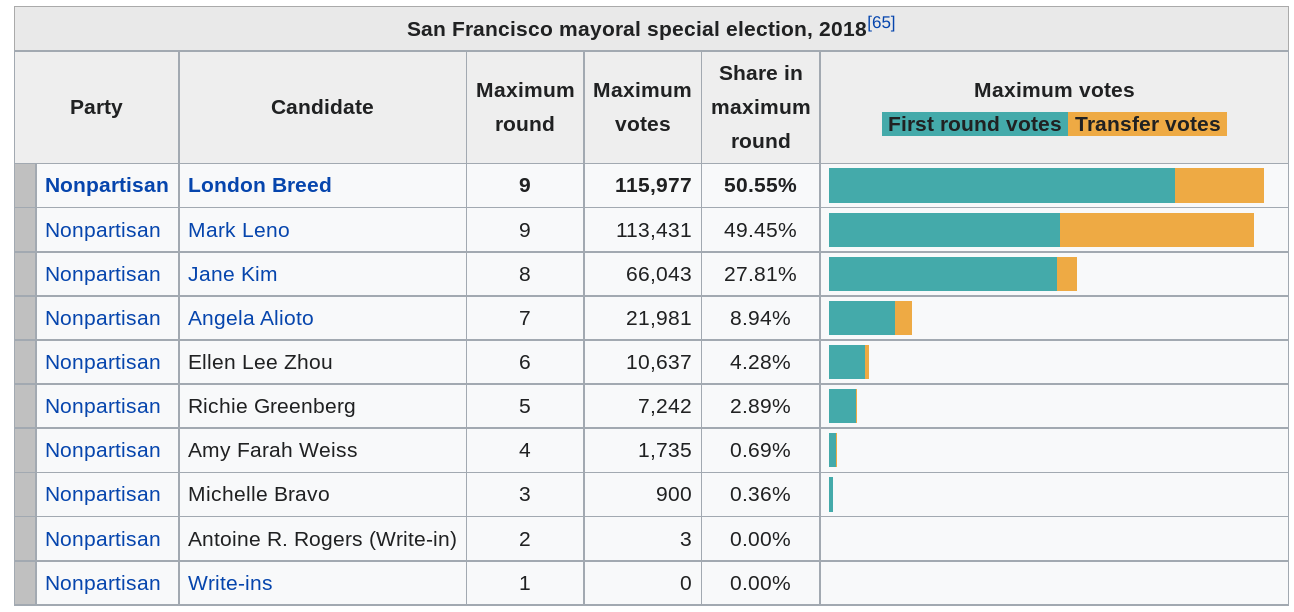Being "non-partisan" (and "conflict of interest" statements)
-
I think Jack brought up a very good point in a message in another thread:
@jack-waugh said in Terms for Specific Voting Systems:
I suspect that many self-described "conservatives" would expect that any proposal to change the voting system comes from "liberals" looking for a way to win elections unfairly at the expense of "conservatives". I put those terms in quotes because I am referring to people using those terms. I do not know what the users of those terms think the "conservatives" want to conserve or what the "liberals" want to liberate. I would use the terms without horror quotes if I stood ready to answer those questions should you ask them of me.
Okay, I'm an unapologetic west-coast "liberal", and I'm not afraid to wear that on my sleeve (even though it caused problems for me in central Missouri at least twice). I also grew up in an unapologetically "conservative" family (where I feared the day when my father would discover Rush Limbaugh after hearing him on my old Ford's AM radio, only to find out that my Goldwater-supporting mother would become an avid Limbaugh listener first). I'm used to living in red counties and blue counties, and I'm familiar with the extremes.
I'm not here to convince any of y'all to be a librul. However, I think we shouldn't kid ourselves about the fact that almost every single of us has a "team color", so to speak, and it's almost impossible to talk about American politics without acknowledging the utter dominance of the two big parties and the utter certainty we can have that a Republican or a Democrat is going to win the 2024 United States presidential election, and that a Democrat or a Republican is going to be the runner up. Maybe someone from the Forward Party will get a non-negligible portion of the popular vote, but we're talking about a Perot-like randomizing, anti-incumbent force, rather than someone with a real chance of winning in 2024.
Given the American political environment (and that, I'm guessing, most participants on VotingTheory.org seem to live in North America), it might make sense if we knew (more-or-less) what each other's political leanings are. I find it much to engage with other English Wikipedia editors when I'm confident that they've fully disclosed their conflicts of interest, and I'd be willing to engage with more authors here on VotingTheory if I knew where they were coming from (even if I didn't agree with their political perspectives). Thoughts?
-
I think we shouldn't kid ourselves about the fact that almost every single of us has a "team color", so to speak
I agree with you on this, kinda, but maybe we should distinguish "revealed color" from "stated color" ?
Weighted by the importance I place on the issues, I find myself firmly supporting blue candidates in today's elections, since the alternative seems to be a party dedicated to bring an end to democratic liberalism.
However, in a sane world, where the future of civility is not at stake, and "issues" are just something that economics nerds argue about on twitter instead of being components of an identity-defining culture war, I actually find myself rarely aligning with leftist proposals (I mean "leftist" literally, not as a dirty word).
That is to say, I'm happy to reveal my COI that my vote for the foreseeable future will exclusively go to the Democratic party, but I would not want one to infer that I consider myself a staunch Democrat.
I do see on your COI page that you've basically formatted it like a resume, I suppose that makes sense to me; let me try the same and see if it's the kind of disclosure you're suggesting:
- I have benefited from access to private education (9th grade onward)
- I have worked at and benefited from a number of programs funded publicly via defense & research spending
- My employment in private industry has included software engineering (at a big tech firm) and now quant finance (at a hedge fund)
I'm not sure what any of those bullets imply in terms of biases / COIs, but is that helpful or kind of what you were looking for?
-
@robla I've always considered that voting theory is a "meta-politics" discussion, and discussing plain-old politics in this context (including just declaring yourself to be on one one side or another) is pretty much the same as discussing it at family Thanksgiving dinner. In that, if you aren't 100% sure everyone agrees with your general position, no good can result from bringing it up and a lot of harm can. All it does is divide people who otherwise can be pursuing a common purpose (whether it being hanging out with family and enjoying good food, or helping navigate the world toward better voting systems)
I also don't look at whatever side I tend to vote with as my "team." It's not just that I have a mind of my own (and I really hate being pigeonholed), but if I want to join a "team," it is the anti-team team. I am in firm agreement with George Washington's Farewell Address sentiments, when he expresses his concerns about factionalism.
https://en.wikipedia.org/wiki/George_Washington's_Farewell_Address#Political_parties
It's worth reading the address itself, specifically this part, which is pretty freaking prescient:
the common and continual mischiefs of the spirit of party are sufficient to make it the interest and duty of a wise people to discourage and restrain it. .... It agitates the Community with ill-founded jealousies and false alarms; kindles the animosity of one part against another, foments occasionally riot and insurrection.
https://en.wikisource.org/wiki/Washington's_Farewell_Address
Maybe I am misinterpreting what you are asking here, but I just don't think this is the place to wear ones politics on their sleeves, and I have always gone out of my way to do the opposite.
On the other hand I have encouraged people to state their preferences as far as voting methods (you'll see mine in my signature), and I think that's useful. I am not shy about my agenda here, which to help reduce the divisiveness in government and the general public, by eliminating choose-one voting. My strategy is to promote Condorcet-compliant methods, while acknowledging that RCV-Hare is a big step in the right direction, even if it doesn't get us quite as far as Condorcet methods do. I also acknowledge that other methods such as STAR and Approval are much better than choose-one, and while I won't bash them, I am concerned that they don't seem likely to make a lot of inroads.
-
@andy-dienes said in Being "non-partisan" (and "conflict of interest" statements):
I'm not sure what any of those bullets imply in terms of biases / COIs, but is that helpful or kind of what you were looking for?
Yeah, this kind of political intro is incredibly helpful to me. Thanks! It seems that you and I have similar political alignments. Even if yours were radically different than mine (e.g. if you were a pro-Trump, pro-insurrection type), I'd still be able to have a civilized, constructive election-method discussion with you. Since "election-method discussions" and "political discussions" are so closely adjacent (and overlapping spaces), it seems impossible not to sometimes have one person believe they're having an "election-methods discussion", while the other person has segued into a thinly-veiled "political discussion". Having an idea where other folks stand makes it easier to make more informed assumptions about them and avoid potential wasteful hotbuttons and avoid wasteful, veiled conversations (since we're all making assumptions about one another, whether or not we want to admit that about ourselves).
I don't think it's necessary for everyone to meticulously describe all of their political conflicts of interest. Just an informal statement would be helpful sometimes. I suppose maybe it's okay if y'all remain a political-alignment mystery to me (or even a mystery with respect to your real-life identity). I just hope that none of you are sockpuppets.
-
@robla said in Being "non-partisan" (and "conflict of interest" statements):
it seems impossible not to sometimes have one person believe they're having an "election-methods discussion", while the other person has segued into a thinly-veiled "political discussion"
I can totally appreciate that. As long as it is confined to a conflict of interest statement, and isn't seen as an invitation to bring up political issues elsewhere. I recently was told in chat on this forum that "if someone is happy with US military activity the way it is, they have no reason to be interested in voting reform or voting revolution." And I cut that conversation off right there ---- I may or may not be on your side on issues about the military or anything else, but that sort of issues-based discussion just isn't welcome in a voting reform context, and the implication that my interest in voting reform implies a particular side on an issue is something I push back on hard.
(unless that issue is something like "is democracy important?" or "should we use better voting systems?")
So, fine. I am pretty far on the left in most senses. I live in San Francisco, on purpose. I'm a bit more law-and-order than some though, for instance I am not as tolerant as some people toward allowing the homeless and mentally ill to fill the streets with filth and shoplift and break into cars without consequences. Compassion is good, but that doesn't mean we can't still keep our city a nice place to live.
I am very pro-choice, but I am rubbed the wrong way by people on the extreme of "my side" who claim that there should be no issue other than a woman's bodily autonomy. I am perfectly fine with banning abortion after a certain stage, with some exceptions. Like almost everything, it is just not a black and white issue. Women's rights to control their own body does need to be weighed against the interests of the developing child-to-be.
Anyone who uses the word "woke" when talking with me, especially as a pejorative, is basically requesting a quick end to the conversation.
My main gripe with the right, though, is their recent tendency toward conspiracy theories, science denial, culture wars and authoritarianism. I don't think of any of those being traditional conservatism, in the least.
-
@rob said in Being "non-partisan" (and "conflict of interest" statements):
I live in San Francisco, on purpose.
@rob: thanks for your statement. Since you and I have met in person (and been to each other's homes), I feel a little more certain that you aren't a sockpuppet tnan I am with other participants.

As for "San Francisco, on purpose", its difficult for me to say the same thing. When you and I first met in person (in 2006), I had convinced my employer to open a Seattle office. Since I was their first Seattle-based employee, they wanted me to spend my first few weeks working at their San-Francisco-based office. You weren't working for the same folks, but we met nearby at Caffe_Trieste (which I believe was your suggestion, since I was the out-of-towner) You bicycled across town to meet up in the early evening, which seems crazy (since I now know just how hazardous San Francisco is for bicyclists, and my understanding is that 2006 was much worse than 2022). Still, I enjoyed my 2006 visit, and visited many more times in the following years.
I reluctantly moved to San Francisco in 2011, but I've come to appreciate the place. However, it seems the politics here are even crazier than Seattle's politics. Did you know they use ranked-choice voting here?
 Wasn't the 2018 San Francisco mayoral special election all sorts of fun?
Wasn't the 2018 San Francisco mayoral special election all sorts of fun?My reluctance about being here is not because of the politics of the place. It's because of the breathless bubble after bubble. But hey, web3 is going great!
-
@robla said in Being "non-partisan" (and "conflict of interest" statements):
But hey, web3 is going great!
Oh boy, you're not going to like what kind of hedge fund I work at

-
@robla You sure I was on a bike? I think it was my Vespa.
@robla said:
Did you know they use ranked-choice voting here? Wasn't the 2018 San Francisco mayoral special election all sorts of fun?
Well yeah.... I thought that election was pretty awesome. I'm not as tuned into local politics as you... but I was happy to see an election that contrasts so starkly with the norm in other parts of the country or on the national level. Purely based on how the election incentivized a healthy mixture of cooperativeness and competition, in the absense of right vs left tribalism, I think RCV did its job beautifully. (I can always wish for Condorcet, but it did elect the Condorcet winner, so IRV flaws didn't do any apparent damage here)
Straying further from the main topic (sorry), I do object to this chart at the Wikipedia link you posted, as it misrepresents Jane Kim's position relative to Leno and Breed. She was very close behind Leno in the round she was eliminated, and if she had beat him, she would have gotten nearly all his ballots (the two of them were near clones, more or less endorsing each other), meaning she as likely as not would have won outright. The chart shows "share in maximum round," making it look like Leno did way better than her, but that's only because it counts the votes that went from Kim to Leno (since she was eliminated) but not ones that could have gone from Leno to Kim (since he barely avoided being eliminated).

Here's what I came up with with a different formula for generating bar chart scores:

Not sure how web3 and such factor in here. Yeah I think that's dumb, but I still like the creative spirit of this town, both in technology and elsewhere. There's a lot of quirky, a lot of beautiful. And no other city has a pirate supply store, that I know of.

-
@rob said in Being "non-partisan" (and "conflict of interest" statements):
I do object to this chart at the Wikipedia link (enwiki:"2018 San Francisco mayoral special election") you posted, as it misrepresents Jane Kim's position relative to Leno and Breed.
I object to it too, but I'm not about to get into an edit war over it. I'm pretty sure that (just like in the general population), there are more advocates of RCV/IRV editing English Wikipedia than there are advocates for approval/Condorcet/etc. I believe that the best thing for you to do (if you want it fixed) is to post a comment on the corresponding "talk" page ("Talk:2018 San Francisco mayoral special election")
-
@robla Yeah, I didn't mean "object" in the sense that I care so much what is on Wikipedia, but just in the sense of "I wish they didn't report RCV elections this way." I guess they (not just Wikipedia, news articles as well) want to make it seem like the winner has a majority, as if majority really makes sense with more than two candidates. There are way better ways of visualizing such elections.
-
Moved from Meta/Forum Business by
 SaraWolk
SaraWolk